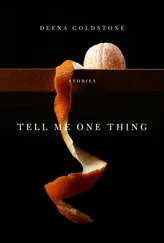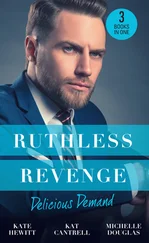“Or come over. I’ll make dinner for the three of us — you, me, and Fanny.”
“Oh, heavens, no! She’s the most disagreeable of women. I don’t even want to talk to her — why would I want to eat with her?”
“She’s your sister.”
“An accident of birth I try to ignore.”
“Meir!”
“When was the last time you called your mother?”
“That’s a completely different situation. She stopped talking to me.”
“Bingo!”
“But Fanny is all alone.”
Meir shrugs.
“What is it about Jewish families?” Isabelle asks sincerely. “There’s always a feud somewhere.”
“At least one a generation.”
“An uncle who hasn’t talked to his brother in forty years, a cousin who’s disowned a son for some long-forgotten transgression. Why do we hold such grudges?”
Meir shakes his head at the vagaries of family. “You can’t tell the heart whom to love, I guess.” He looks longingly at Isabelle, whose back is turned as she rings up another customer’s purchase. “It goes its own way, however inconvenient.”
This morning Isabelle takes her customary place behind the front counter, alone until the afternoon. She spreads cream cheese on her bagel, takes another large shot of caffeine — oh, if only she could mainline the stuff — and opens her laptop. And there it is. A response from Daniel.
Isabelle,
What happened to Melanie? Are you writing?
Daniel
That’s it. That’s all. Not How nice it is to hear from you after all these years or Tell me about your son or any other pleasantry. No, he cuts to the chase. Well, that’s Daniel, isn’t it? When has he ever made small talk? Should she tell him the truth? Will he disown her? Be disgusted with her lack of dedication? But then she remembers what Stefan told her that morning in Lathrop Hall when she was waiting outside Daniel’s office with cappuccinos: He’s got writer’s block, you know. He can’t help himself, so good luck with his helping you.
Maybe there will be some compassion there for her lack of productivity. Maybe…She deliberates, but in the end she answers Daniel because she wants him back in her life, however peripherally. And she answers honestly, because there has always been that between them — honesty — and she honors it, however difficult.
Daniel,
Sometimes I write a little. But not very often and never about Melanie. She is an outlaw and I shop at the co-op, stack books during the day, and play Chutes and Ladders. How can I begin to understand Melanie?
My son often wakes up screaming at night so I don’t sleep much now. It’s called “night terrors” and it will pass as he gets older, but right now there’s always the possibility that this night will be the one. And so I stay awake and wait.
It feels like I’m on watch, and writing feels to me like disappearing into another world, and so they are in conflict. Right now it has to be that I am in this world, our world, with my son. He’s only three.
Isabelle
—
DANIEL HAS COME BACK TO BEV’S for lunch. He couldn’t stay away. He needs the Internet access. He needs to see if Isabelle has answered his question— Are you writing? And she has! With a hunger that animates him, he reads her answer. Ah, her life is all about her son. He knows what to say. He writes:
Isabelle,
Having spent the past several years with my son — my clueless, hopeless, unhappy son — I realize I sacrificed him to my ambition to write. It’s a loss I mourn every day.
I know you will do better with your son.
Daniel
Daniel,
Are you telling me not to write?
Isabelle
Isabelle,
Of course not. Just not to be stupid about it the way I was. Selfish. Heedless. Unconscious, really, I now see.
But I know you won’t be. You’re made of better stuff.
Daniel
Isabelle reads that last e-mail between customers. Oh, Daniel, I am not. Look at what I did — got pregnant when I didn’t want to, tied myself to a man who has no need of home, who flees into danger rather than away from it.
But she writes none of that to Daniel. If she puts it on paper, then it’s tangible and she’ll be forced to face it. If she doesn’t actually say it — to Daniel or Deepti (who already knows it, Isabelle suspects) or to Meir (who is waiting for her to say something along those lines, she is sure) — then there’s still hope that one day Casey will tire of this life, one day he will want them, his small family, more than he wants to fly off to Mongolia.
Instead she writes:
Daniel,
I think you have a completely skewed idea of who I really am. You remember that eager, hopeful, yearning student who knocked on your door many years ago, the one who blossomed because you believed in her dream to write.
But something happened to that girl.
Isabelle
Daniel answers her immediately.
Isabelle,
What happened?
Daniel
And alone in Noah’s Ark — no customers at the moment, Meir’s presence several hours away — Isabelle ponders Daniel’s question. How to explain what has happened? She starts typing without thinking, without allowing her better judgment to stop her.
Daniel,
It’s not just Avi’s birth, although that changed everything. Being a mother shifts all the priorities. (I can hear you saying, Good, that’s what I didn’t do with my son.)
It’s that I took a risk. I became another person for a short while. I let myself love Casey without restraint. I refused to be cautious. I embraced the moment in a way I was brought up to avoid. I dared to believe life could be glorious.
And I was proven wrong. That’s why it’s so hard for me to write. It takes a leap of faith, and I no longer believe I can do it.
Isabelle
Isabelle hits Send and stares at all the shelves and shelves of books that other people have managed to write, despite their life conditions, despite their bad choices, despite their doubts, and she knows somewhere deep inside her that she’s trying to explain away her most basic flaw: that she’s a coward.
The main street of Winnock consists of a stretch of red brick buildings three stories high, leaning shoulder to shoulder as if holding each other up, positioned on either side of the two-lane road that takes people into and out of the small town. Traditional stores, rooted in Winnock for generations, are mixed with shiny new boutiques which cater to the weekenders up from Boston and other Massachusetts cities.
On the east side of the street, in a line, are seven shops. First is Le Breton’s Gourmet Foods, open just a year; then Better Living Realtors, and Sewell’s Pharmacy with its white bead-board facade nailed over the original brick and a front window packed with ace bandages, stomach remedies, and blood pressure monitors. Next is Bev’s Bakery, painted a cornflower blue as a welcome call, and then the dusty, rarely open Antiques and Collectibles, the Granite State Diner with its red neon sign, and finally, on the end, Chatterton’s Ice Cream Parlor, where the teenagers from Winnock and surrounding towns hang out, clogging up the sidewalk and adjacent parking lot.
Six stores line the west side of the road: first a bookstore, Leighton’s, recently opened, to Daniel’s delight, which sits directly across from the gourmet shop, then Don & Tom’s Hardware, in operation since before World War II and stocking everything from drill bits to Tupperware. Bike-orama is next in line — sales and service — the Winnock Arts & Crafts Gallery, the post office, and, at the end of the block, a small local grocery, owned by Gordon Tibbett, which caters to those families who would never buy the foie gras or paper-thin prosciutto or loquats flown in from the Caribbean that line Le Breton’s shelves.
Читать дальше












